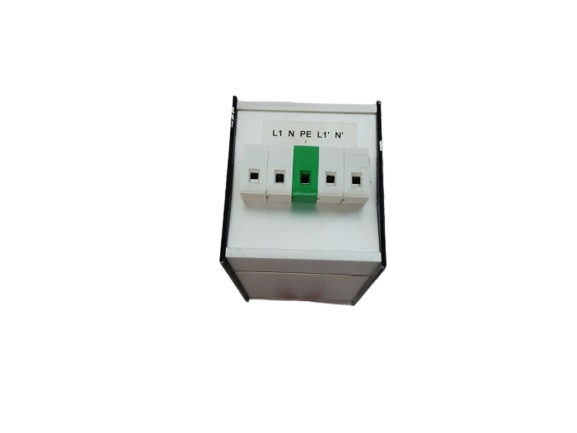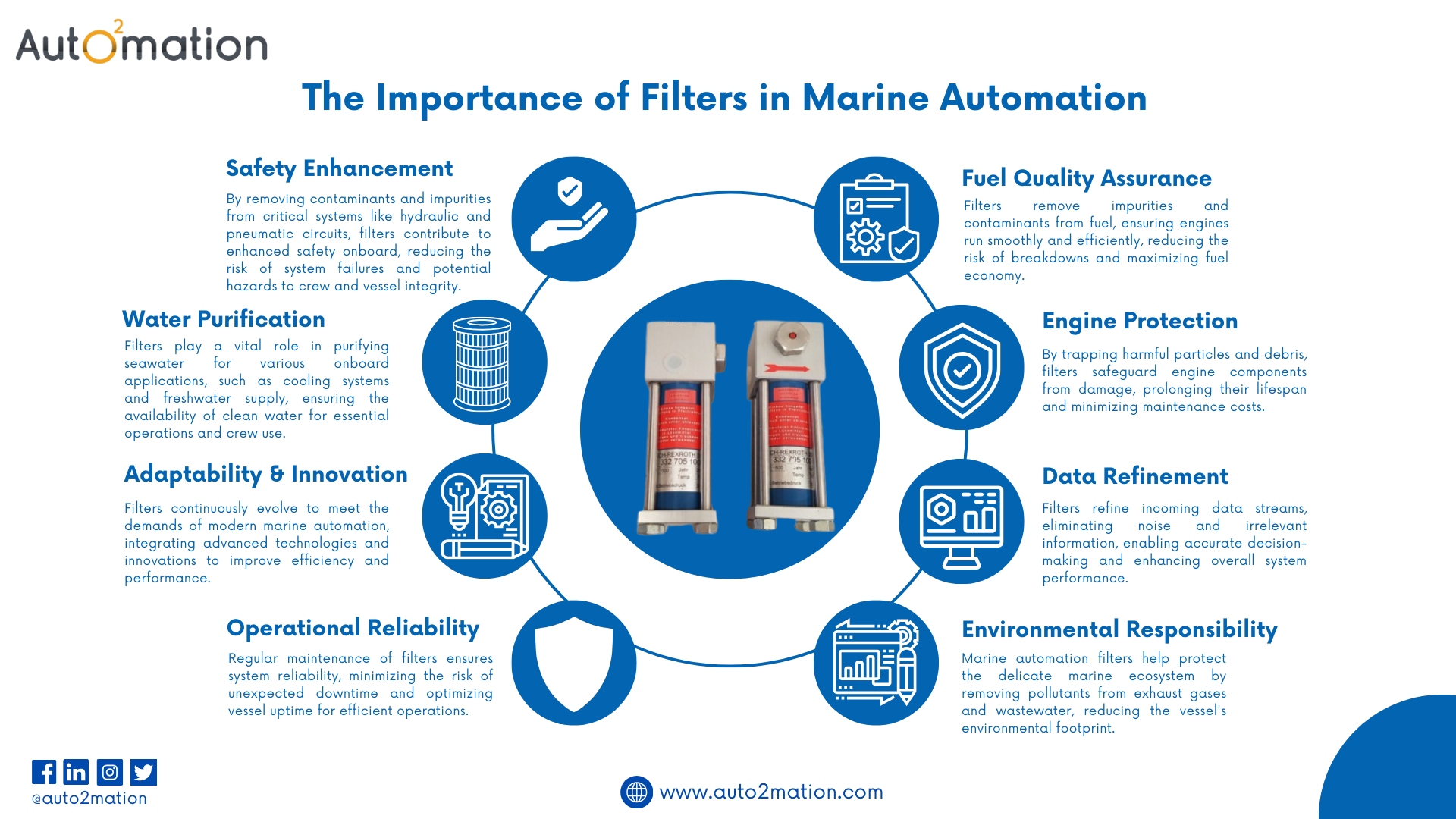For optimal operations and safety in the oceanic environment, marine automation systems highlight efficiency and reliability. For maintenance, filters are significant in helping automated systems perform well, prevent costly damage, and sustain continuity of function. Among others, fuel, hydraulic, and air filters have particular purposes. The following blog will outline the top filters, which can increase your efficiency on a marine automation level, highlighting their applications, benefits.
1. Fuel Filters

Fuel filters are very important in marine engines and automation systems. These remove impurities, such as dirt, rust, and water, from fuel. This ensures that the engine is not damaged and keeps running continuously.
Benefits:
- Prevent clogging and wear in the engine.
- Ensure constant fuel flow.
- Reduce maintenance costs and downtime.
Applications:
- Used in diesel and gas-powered marine engines.
- In the fuel delivery systems of automated vessels.
2. Hydraulic Filters
Hydraulic systems are the center of most marine automation systems powering steering, winches, and stabilizers. Hydraulic filters filter out contaminants in hydraulic fluid, ensuring smooth, efficient running.
Benefits
- Protects hydraulic components against wear.
- Maintains hydraulic system performance.
- Extends the life of hydraulic fluid and components.
Applications
- Used in steering systems, cranes, and other hydraulic equipment.
- Absolutely crucial to automation systems that employ hydraulics.
3. Air Filters
Air filters prevent dirty air from entering engines and other critical systems. The filter catches dust, debris, and airborne particles that may cause damage.
Benefits:
- Prevents contamination of the engine and system.
- Improves on fuel efficiency and performance.
- Removes chance of overheating.
Applications:
- Applied on marine engines, HVAC as well as air intake system on automation equipment.
4. Oil Filters
Oil Filters ensure that the health status of the engine and also other machinery is kept track. They remove impurities from oil, thus reducing damage and ensuring that its lubrication is effective.
Benefits
- Keeps oil clean for optimal lubrication.
- Reduces wear and tear on engine parts.
- Increases the life and efficiency of the engine.
Applications
- Marine engines and automation systems with lubricated parts use it.
5. Water Filters
It needs use in applications where water uses for cooling and any process because it removes debris, minerals and other contamination elements that induce scaling and corrosion.
Benefits
- Reduces the obstruction and corrosion in the pipes.
- Maintains efficient heat transfers and cooling.
- Reduces requests placed on water systems for service.
Applications
- It utilizes in coolers, the application in desalination and aboard water treatment.
- Replace them when necessary to ensure your water quality.
6. Air Dryer Filters
The air dryer filters are among the major parts of compressed air systems used in marine automation. Air dryer filters remove impurities and moisture, so that the pneumatic components of the system operate uninterruptedly.
Advantages:
- Prevents corrosion and freezing within the air lines.
- Extends pneumatic equipment life.
- Ensures constant air pressure and flow.
- Used in compressed air powered tooling, machinery as well as in automated control systems.
7. Particulate Filters
Captures microscopic debris and contaminants from any of the systems, whether it is fuel, air, and water systems, hence promoting better system performance.
Advantages:
- The sensitive parts are protected from damages.
- The system becomes efficient as well as more reliable.
- It lowers the maintenance and replacement costs.
Applications:
- They are installed in fuel injection systems and air intake systems, and water treatment systems.
8. Coalescing Filters
Coalescing filters filter oil, moisture, among other impurities in the compressed air and gas systems. Their effectiveness depends on the pneumatic automation system.
Advantages
- Oil-free and dry.
- Protects the downstream equipment.
- Overall efficiency of the system improves.
Applications:
- Pneumatic system and air compressors
9. Magnetic Filters
Magnetic filters are employed in systems where other types of filters may not be sufficient in catching the metal particles and debris. The filters are highly effective in lubricated systems and gearboxes.
Advantages
- Metallic contaminants are collected with high efficiency.
- Machine components wear out less due to reduced friction.
- Increases the life expectancy of lubricants and systems.
Applications
- It is applied in gearboxes, engines, and hydraulic systems
10. HEPA Filters
HEPA filters, as one may be aware, capture extremely tiny particles and thus are ideal for clean environments in marine automation.
Advantages
- Provide excellent air filtration.
- Protect sensitive equipment and personnel.
- Ensure tight environmental compliance.
Applications
- Use in control rooms, HVAC systems, and clean compartments onboard.
Choosing the Right Filters for Your Marine Automation

This will depend on what you require for your marine automation systems. The following are some factors that will come in handy in making such a choice:
- System Type: The type of systems installed onboard and their filtration requirement.
- Contaminant Type: Type of impurities you need to filter out like particles, water or oil.
- Capacity: Capability of the filter to catch up with the system's capacity and flow rates.
- Quality: Filters of high quality from good manufacturers for long-term reliability.
Filters are simple components in marine automation. The proper selection of filters and proper maintenance of filters lead to better performance and a longer life of marine automation. Either one can be either a fuel filter or air or hydraulic that ensures smooth operations and does not lose valuable equipment due to preventive maintenance planning ahead with the quality filters placed at appropriate positions in your marine automation.





Validate your login
Sign In
Create New Account